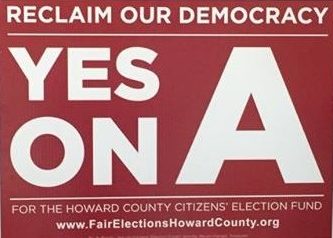By Len Lazarick
Howard County voters approved setting up a system of public financing for people running for County Council and executive with a safe 7,500-vote margin, though the measure actually lost among people who voted on Election Day by 2,000 votes.
Question A proponents — a coalition of good government and progressive groups outspent the organized opponents — mostly Republicans — at least 10 to 1 if in-kind support from progressive organizations is counted.
The 53%-47% victory for Question A was surprising given the positive wording of the ballot question and how weak the opposition seemed and how late a start they got, even though County Executive Allan Kittleman was against the measure.
Sponsors on the Howard County Council plan on introducing legislation to implement public financing in March.
Proponents raised $306,000, with $236,000 of that coming from Common Cause, the good government advocacy group. Common Cause got $45,000 of that back for consulting fees and campaign workers.
Thousands of small donations were given online by over 4,500 people in response to Common Cause, most of them out state.
Public financing advocates spent the money on at least two mass mailings to voters, media advertising and payments to groups including Maryland PIRG Citizen Lobby and Progressive Maryland for grass roots organizing.
In addition to the cash contributions, other groups contributed over $86,000 in staff time, printing and outreach to their members. This included the Democracy Initiative ($38,500), the League of Conservation Voters ($19,000), Progressive Maryland ($18,000), the Sierra Club ($4,200) and Our Revolution ($3,000).
“We reported every last penny that we could” in the interest of transparency, said Jennifer Bevan-Dangel, executive director of Common Cause Maryland and treasurer of Yes on Citizens Election Fund, the coalition campaign committee.
Bevan-Dangel said the groups decided to be scrupulous in reporting staff time that may not have been legally required.
Opponents spent on social media
The opponents didn’t get organized till the fall and raised just $37,000 from a handful of regular Republican donors — Kingdon Gould ($10,150), Chip Lundy ($10,000), and $5,000 each from Apple Ford (George and Chip Doetsch), CB Flooring (Carol and Chuck Bode), and J.P. Bolduc, with the Republican Central Committee donating $1,500.
The major objection to public financing is that in the Howard County version public tax dollars will be used if voluntary contributions from taxpayers aren’t sufficient. Most of the opponents’ money was spent on social media advertising, but that turned out to be very effective.
Bevan-Dangel said that when the social media campaign against Question A began “we started to get a lot of questions” being raised with organizers in the field.
At that point, proponents “panicked” and Common Cause began raising money online from its members across the country.
“Social media is really changing the policy debate,” Bevan-Dangel said.
In the end, the charter amendment got 57% in early voting, with higher turnout from Democrats, and 58% among absentees, but only 49% on election day.
County Council must craft plan
Now the council must craft the legislation to implement the program with specifics.
Jon Weinstein, the lead sponsor of Question A and newly elected chair of the council, said he was hoping for a wider margin to pass it, but “we have a very popular county executive against the bill.” Plus, Weinstein said, opponents “were using very stark language against the bill that was inaccurate,” such as the assertion that candidates could raise additional funds from political action committees.
The specifics of how to implement public financing for local campaigns must be put into legislation.
Weinstein said that there would be informational public discussions by the council in January, with enabling legislation introduced in March for an April vote.
Under the coalition proposal presented during the election, an independent commission would make funding recommendations to the county executive and County Council for annual appropriations to ensure the program is available for qualifying candidates in the 2022 election cycle — giving it five years to ramp up.
Voters would be allowed to make a check-off on their local income taxes to fund the program, with the rest of the money coming out of the county budget. The legislature would have to approve the check-off on the state tax returns used to collect the local share.
Weinstein said they may look for ways for residents to contribute to the fund on their local tax or water bills.
The sponsors and the coalition are also proposing that donations to candidates be limited to $150, with the first $50 from a donor matched six to one for executive or four to one for council. Candidates for executive would have to raise $40,000 on their own before being matched, and candidates for council would need to raise $7,500. Matching funds from the county would be capped at $750,000 for executive, and $75,000 for council, limits deliberately set below what is spent in successful campaigns for these offices.
Weinstein said he plans on talking to Kittleman about the enabling legislation, recognizing that he “clearly opposed it.”
“Hopefully, we’ll try to find something that works across the board,” Weinstein said.
Portions of this article already appeared in The Business Monthly serving Howard and Anne Arundel Counties.




Recent Comments